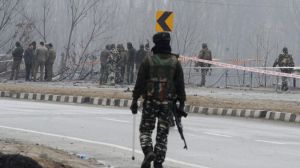Letter of the WEEK
Little Kosovo’s declaration of independence last week could have huge implications.

Little Kosovo’s declaration of independence last week could have huge implications. Radha Kumar of New Delhi (‘Uneasy on Kosovo’, IE, February 28) joins the debate begun on these pages.
• Pratap Bhanu Mehta’s article on Kosovo, ‘As easy as Kosovo’, is wrong on almost all counts. Kosovo’s declaration of independence does not set any international precedents. It is an exclusively regional, European issue. Indeed, the US-EU policy to back Kosovo’s independence removes the country from UN trusteeship to EU responsibility, thereby bypassing the question of international precedents.
Second, what is so justifiable about Russia’s taking offence? Russia’s security is not threatened in any way, and Kosovo is not a significant blip in Russia’s long existential battle with Europe. Far more important is US missile defence in central Europe, which does set a strategic boundary between Europe and Russia.
What is of serious concern is the impact on Bosnia, Macedonia and Serbia…
Finally, Mehta concedes that the Serbian nationalist leadership had indulged in crimes against humanity, but suggests that the new Serbian leadership could have reached a negotiated settlement on Kosovo. Has he forgotten that the previous Serbian leader who attempted to do so was assassinated, in 2003?
Clarification Kosovo
• Contrary to what Radha Kumar thinks, her letter only substantiates my argument; it does not prove it wrong. First, she rightly points out that Kosovo may have serious implications for Bosnia, Serbia and Macedonia. I was trying to make the larger point that the link between sovereignty and ethnicity that the US and EU are now legitimising is itself a source of instability and violence. Second, she argues that US-EU policy bypasses the question of setting a precedent by removing the country from UN trusteeship to EU responsibility. The question is: whose decision is this? Who decides whether it is a UN issue or a regional issue? The United States? The fact is that in self-determination cases there is more power play than the rule of law and the EU is engaging in just that.
Third, the point I was making about Russia was a political, not a normative one. Radha Kumar concedes that on missile defence the West has put Russia on the back foot. All I was saying was that, given the history of NATO-Russia relations, it is not surprising that there is no via media in this matter. Kosovo is about global geopolitics, not a “regional matter”.
Fourth, the fact that the Serbian leader who could have negotiated a settlement cuts both ways: most leaders who negotiate settlements are targets of assassination, from Israel to Punjab. Is that enough reason to stop trying? But there is now an altered context of the Serbian aspiration to join the EU. Instead of leveraging that for creating a multi-ethnic state, EU wants to legitimise the very principle that is the source of trouble: the link between ethnicity and sovereignty. And the burnt churches in Kosovo are also testament to the fatality of organicist nationalism.
New Delhi
Karnataka plea
• This refers to your timely editorial, ‘May there be polls’
. The Congress party’s demand made before the EC for delaying the assembly polls in Karnataka owing to incomplete remapping India’s political geography is an attempt to buy time. Its demand is more to do with the expected waning of public sympathy for the BJP. Let the poll roll on time and people decide the fate of all political parties in the state.
Delhi
Photos





- 01
- 02
- 03
- 04
- 05


























